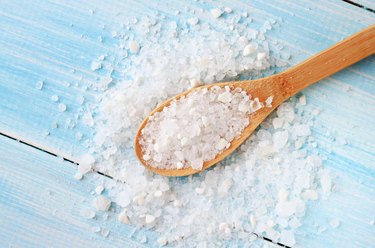
While a low-sodium diet is usually considered healthy, there is an electrolyte imbalance called hyponatremia that occurs when blood sodium levels are too low in the body.
Hyponatremia — i.e., low blood sodium levels — can be acute or chronic, and if left untreated, it can cause neurological symptoms, brain damage and even death.
Video of the Day
Video of the Day
Fortunately, treatment and prevention of hyponatremia is possible. The first step is to raise your blood sodium levels, but the method of doing so will depend on the cause of hyponatremia and severity of your symptoms.
Here, learn what happens when your body is low on sodium and how to increase your sodium levels.
What Causes Low Sodium Levels?
Hyponatremia can be acute or chronic. Acute hyponatremia is when the sodium level in your blood drops quickly, according to the Mayo Clinic. Acute hyponatremia is dangerous because it can cause serious neurological damage or death. Chronic hyponatremia develops more gradually, usually over the course of several days, and causes more moderate symptoms.
Underlying conditions such as thyroid, adrenal or kidney disease can cause hyponatremia, as can taking certain medications, including diuretics and antidepressant medications, according to the Mayo Clinic. If that's the case, your health care provider may recommend stopping your medication or adjusting your dosage.
If a medication or underlying health problems is not the culprit, your health care provider will likely ask about your water-drinking habits.
"If you're drinking 6, 7 or 8 liters of water, you just may be drinking more than you're able to excrete," says Daniel Weiner, MD, FASN, a nephrologist and an associate professor at Tufts University School of Medicine.
In other words, drinking too much water can dilute the sodium in your blood, causing low sodium levels.
Warning
You should call 911 or go to the emergency room right away if you develop severe hyponatremia symptoms, which include nausea and vomiting, confusion, seizures or loss of consciousness. Severe, acute hyponatremia is a life-threatening emergency that usually requires treatment and monitoring in the hospital.
Who Is at Risk for Hyponatremia?
There are a few different things that increase your risk of developing hyponatremia. These include the following, per the Mayo Clinic:
- Age: Older adults are at higher risk.
- Certain medications: Including diuretics, some antidepressants and pain medications. The recreational drug Ecstasy has also been linked to fatal cases of hyponatremia
- Underlying conditions: Including kidney disease, syndrome of inappropriate anti-diuretic hormone (SIADH) and heart failure
- Intense physical activity: Including marathons, ultramarathons and other long-distance, high-intensity sports
Symptoms of Low Blood Sodium Levels
When your body is low on sodium, the following might happen, per the National Kidney Foundation:
- Nausea or vomiting
- Headache
- Confusion
- Fatigue
- Low blood pressure
- Muscle weakness, twitching or cramps
- Restlessness
- Seizures or coma
Complications of Hyponatremia
If left untreated, hyponatremia can cause more severe health issues. This is especially true in acute hyponatremia, when blood sodium levels drop rapidly.
Complications include the following, per the Mayo Clinic:
- Rapid brain swelling
- Coma
- Death
- Brain damage (especially for people in premenopause, as female sex hormones are related to the body's ability to regulate sodium levels)
Tests to Diagnose Hyponatremia
There are a few different tests that doctors use in tandem to determine whether you are experiencing hyponatremia, per the Cleveland Clinic. These include:
- Urine tests: These will determine your sodium, potassium and creatinine concentrations in your body
- Blood tests: These will determine your water levels, your levels of sodium and sometimes your level of hormones that regulate water uptake by the kidneys
- Physical exam: Your doctor will do a regular physical exam to find other symptoms
Your doctor may also ask questions regarding your lifestyle, including what exercise/intensity of exercise you participate in, medications you take, medical conditions and surgeries you have or have had in the past, how much alcohol you drink and if you take recreational drugs (like MDMA or Ecstasy).
While there are medical tests that check sodium levels, there are no reliable ways to check your sodium levels at home.
How to Prevent Hyponatremia
The first line of defense when it comes to preventing hyponatremia is making sure your water and electrolyte intake is balanced throughout the day. Make sure you are not drinking too much or too little water.
You can replenish sodium lost through excessive sweating, vomiting or diarrhea with an electrolyte drink or by eating a salty snack, per the Cleveland Clinic.
Cases of acute hyponatremia happen when you've lost a lot of salt but then drink too much water without replacing salt levels, per the Cleveland Clinic.
This is why it's especially important for athletes who sweat excessively to drink sports beverages that contain sodium and other electrolytes (or consume sodium in other forms) in addition to staying well-hydrated by drinking enough water. One way to know you are properly hydrated is through the color of your urine — you want it to be pale yellow or clear, per Kaiser Permanente.
"If you're exerting yourself on a hot day and you're sweating a lot, you'll also want to have water with some electrolyte in it," Dr. Weiner says.
Just make sure you're not drinking too much water too quickly, which can result in rapid sodium loss. This is why it's best to spread hydration out throughout the day, per the Cleveland Clinic.
Treatments for Hyponatremia
Acute hyponatremia that causes severe symptoms such as vomiting, confusion, seizures or loss of consciousness should be treated immediately in an emergency room with an intravenous (IV) sodium solution.
For milder cases, treatment might include the following, per the Cleveland Clinic:
- Cutting back on fluid intake
- Treating underlying conditions
- Stopping or changing medications that affect blood sodium (under a doctor's supervision)
- Eating foods that raise sodium levels
Foods That Raise Sodium Levels
In the vast majority of cases, low-sodium symptoms are not caused by getting too little salt in your diet, and your health care provider will rarely recommend increasing your sodium intake to address it, Dr. Weiner says.
However, if you have syndrome of inappropriate antidiuretic hormone (SIADH), which causes your body to retain too much water, you may be advised to consume more high-sodium foods or add more table salt to your meals, he says.
If your doctor does recommend eating more salt, you can reach for some of these foods in moderation, according to the Dr. Rela Institute and Medical Centre:
- Processed or canned foods such as soups, sauces and snacks
- Cheese and other dairy products
- Meat and poultry
- Seafood, such as shrimp and oysters
- Veggies like beets, carrots and celery
- Condiments like soy sauce and ketchup
- Sports drinks or electrolyte mixes that include water, sugar, potassium, sodium and chloride
Tip
If your sodium levels are too high (hypernatremia), on the other hand, you should aim to eat low-sodium foods and keep your daily sodium intake to less than 2,300 milligrams, per the FDA.
How Long Does It Take to Recover From Low Sodium Levels?
While acute hyponatremia typically lasts less than 48 hours, chronic hyponatremia can occur over days or weeks.
This means it could take anywhere from a few days to a few weeks to recover from low sodium levels, depending on the medical intervention used, per Mount Sinai.
When to See a Doctor
If you experience one or more of the side effects of low blood sodium — including low blood pressure, muscle twitching and cramping, confusion and seizures — call your doctor or visit your nearest emergency room as soon as possible.
Likewise, if you know you're at risk for hyponatremia and experience headaches, confusion, nausea and vomiting, visit your doctor, who can help determine the cause.
Hyponatremia, whether acute or chronic, can be treated and prevented through balancing your electrolyte intake and staying aware of your symptoms.
FAQ
1. What Can I Drink to Raise My Sodium Level?
Try electrolyte drink mixes like Scratch Labs Hydration Powder ($21.95 for 20 servings, Amazon) or Liquid IV Hydration Multiplier ($23.45 for 16 servings, Amazon).
Or try drinks naturally high in electrolytes, including coconut water, watermelon juice, tart cherry juice and water infused with lemon, lime or ginger.
You can also drink canned soups, broth, bouillon, tomato juice or vegetable juice, which have higher amounts of sodium.
2. Is Gatorade Good for Low Sodium?
The sodium content of Gatorade is about 450 milligrams per liter, which does make it a good drink to help you replace sodium lost through sweating, vomiting or diarrhea, per the University of Washington.
Keep in mind, though, that Gatorade contains a high amount of added sugar (about 14 grams per 240-milliliter serving), so you'll want to drink it in moderation to make sure you're not consuming too much sugar.
3. Should I Eat More Salt if My Sodium Is Low?
As Dr. Weiner mentioned, increasing sodium intake through food is not the first line of defense to treat hyponatremia.
But if your doctor does recommend it because you have an underlying health condition, they may recommend adding a little more salt to food you regularly eat.
Ultimately, though, most people should stick to eating less than 2,300 milligrams of sodium per day, unless otherwise advised by their doctor, per the FDA.
- U.S. National Library of Medicine: "Low Sodium Level"
- American Family Physician: "Management of Hyponatremia"
- Mayo Clinic: "Why is low blood sodium a health concern for older adults? How is it treated?"
- FDA: "Sodium inYour Diet"
- Mount Sinai: "Low Sodium Level Information"
- Dr. Rela Institute and Medical Centre: "How to Increase Sodium Levels"
- Kaiser Permanente: "10 warning signs of dehydration"
- Cleveland Clinic: "Dehydration"
- University of Washington: "Battle of the Beverages"
- Cleveland Clinic: "Hyponatremia"
Is this an emergency? If you are experiencing serious medical symptoms, please see the National Library of Medicine’s list of signs you need emergency medical attention or call 911.


